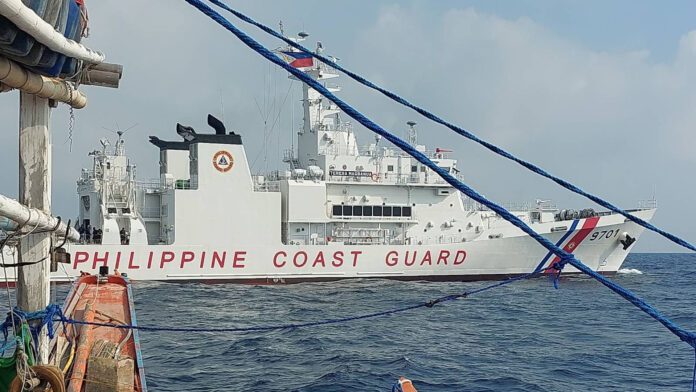The Philippine Coast Guard (PCG) continues to strengthen its presence in the West Philippine Sea (WPS) as part of the Marcos administration’s commitment to protect the country’s territory.
Commodore Jay Tarriela, PCG spokesperson for WPS, said they would carry out “constant” patrolling to safeguard the country’s exclusive economic zone (EEZ) and provide support to Filipino fisher folk, especially those who are victims of reported “bullying” and “harassment” by the Chinese Coast Guard (CCG).
“Then and now, the Philippine Coast Guard has intensified our presence in the West Philippine Sea, with the guidance of our President (Ferdinand R. Marcos Jr.),” Tarriela said during the Saturday News Forum in Quezon City.
“We still have that commitment that we are going to comply with the directive of our President that no square inch of our territory will be surrendered to any foreign powers.”
The CCG maintains its presence in the WPS, with at least 30 suspected maritime militia ships spotted by the PCG during its maritime domain awareness flight on Tuesday.
A total of 26 Chinese maritime militia vessels were sighted in Sabina Shoal and four more were in the Ayungin Shoal.
The PCG aircraft also received “inaudible” English radio challenges from CCG-5304, prompting the PCG to issue a radio challenge to inform them of the maritime domain awareness flight and directed the Chinese vessels to leave.
Before the recent development, a CCG vessel on Feb. 6 “shadowed” and pointed a military-grade laser toward the PCG patrol vessel BRP Malapascua, temporarily blinding its crew.
Tarriela said it is up to the Department of Foreign Affairs to determine whether CCG’s acts were “provocative, aggressive, or just a form of harassment.”
“This is the job of the Department of Foreign Affairs, how are they going to label this kind of behavior from the Chinese,” he said.
Quizzed as to how the PCG would respond to China’s recent actions, Tarriela said that according to the rules, they are not expected to use force unless an equivalent force would be used against them.
He, nevertheless, said the Marcos administration’s current policy is to publicize the maritime incidents in WPS.
The latest strategy would prompt the Chinese government to issue a statement, he said, noting that Beijing tends to be silent whenever Manila files a diplomatic protest against the CCG’s aggressive acts in the WPS.
“All the incidents that are happening right now, we are making it publicly available. That’s why there is awareness among the Filipino people, among the media practitioners. And the international community is also aware of what the Chinese has been doing in the past weeks,” Tarriela said.
“With all those occurrences of bullying behavior, harassment of Filipino fishermen, the Philippine Coast Guard can document. Once we publicize it, we are expecting that the Chinese will react.”
On Feb. 18, Marcos expressed optimism that the Philippines and China would be able to resolve the issues being reported in the “past few weeks and months,” given that the two nations are “close friends.”
Upgrading
Tarriela likewise appealed to legislators to support the PCG’s modernization program that would strengthen the safeguarding of the country’s territory.
“We have been requesting our legislators to support the Coast Guard modernization for us to acquire more offshore patrol vessels,” he said.
Tarriela said the PCG has acquired three offshore patrol vessels through loans – two from the Japan Official Development Assistance and one from France.
The PCG also plans to establish more offshore response bases, including in Palawan, to intensify patrolling capabilities in the EEZ, he said, noting that PCG vessels dock at ports they do not own.
“When the space is needed by the port, we have to remove our vessels and transfer them to another free space,” he said.
Coordination with US Coast Guard
Meanwhile, Tarriela said a joint patrol agreement with the United States Coast Guard is in the initial stages and “small talks” have been conducted.
“We support a joint patrol with the United States Coast Guard. We believe that the common functions of the Philippines Coast Guard and the United States Coast Guard in ensuring maritime safety, protecting the marine environment, and conducting maritime law enforcement are those functions na makakapag-generate ng (that will generate) more regional cooperation among ASEAN neighbors,” he said. (PNA)
Photo credit: Facebook/coastguardph


